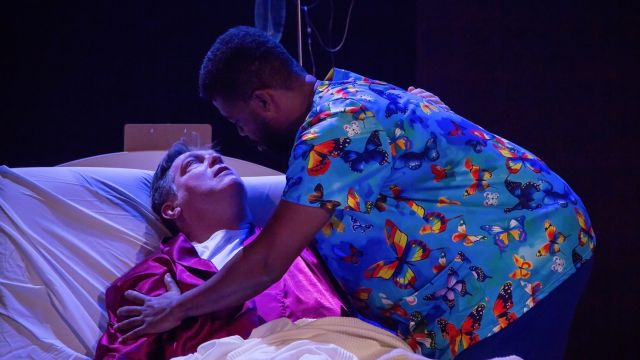Angels in America: A Gay Fantasia on National Themes (Parts 1 &2)
The University of Adelaide Theatre Guild (UATG) has chosen a brave and substantial piece of theatre for their May season. Angels in America, by Tony Kushner, is a two-part play, presented in two halves over two separate performances. Part one debuted in 1991 and 18 months later, Part two premiered. Set in New York City in 1985, it takes us back to AIDS, the 20th century pandemic that introduced us to the pervasive, uncontrollable nature of pandemics and the havoc that they wreak. It is said that the two halves stand alone, I do not believe that Part two would be as powerful without the foregrounding of Part one. The play is a complex, often metaphorical, and at times symbolic. Certain major and minor characters are supernatural beings (angels) or deceased persons (ghosts). So, simple this is not.

Topping 7 hours over the two shows it is an immense commitment for the performers and production team, as well as audience members, like me, who chose to see both halves in one day. The play is described as a gay fantasia, embracing the fact that it uses a mixture of different forms or styles and the intimacy of The Little Theatre is an excellent venue for this confronting and very personally engaging play.

A cast of eight fine performers undertake both main roles and minor characters and the speed of complex costume changes, attributed to the organisation of the costume and dressing team, meant that momentum was never lost as characters morphed into their multiple identities. It was impressive. The lighting designed by Mark Oakley and operated by Rowan Gedling is a triumph, adding significantly to the mood and audience access to the play. The sound effects create important ambiance and perhaps my only criticism of the whole show is that with amplified voices, the diction and words were often not clear. I did, however, love the vocal special echo effects where the sound for The Angel was ethereal and somewhat eerie. The distinctive speaking style of the Angel is deliberate. Kushner's characters adopt a range of speech patterns, from the girl-talk and bantering of Belize and Prior to Joe's legalese to the endless sentences of Louis's hyper- intellectual diatribes thus the fantasia.

The story has more layers than an onion and occasionally the number of issues being explored in the story become almost unbelievable. Matthew Houston plays Prior Walter and his role is pivotal and his work is believable and particularly moving when he is ‘in drag’. In Part 1, Millennium Approaches, we discover that Prior Walter is HIV positive and incidentally, is challenged to save humankind and the universe. His Jewish boyfriend, Louis Ironson, played with power and self-destructive angst by Lee Cook, leaves him for a straight, tortured Mormon, played by Lindsay Prodea. Louis is despicable, yet compelling as his life is challenged at every turn. Prodea, as Joe Pitt is anguished, tortured by his real feelings, hamstrung by his faith and his pill popping, insecure wife, Harper, played by Casmira Loren. These are two fine, measured performances with close attention being paid to dialogue, stance and gesture. We meet Brant Eustice who becomes Roy Cohn. He exudes rudeness, dominance and ruthless manipulation in every scene; blithely disinterested in anyone but himself and his personal crises. Eric McDowell, as Belize is a welcome recent addition to Adelaide theatre and he too has four roles. A standout is his interactions with Louis and Prior, showing versatility and sensitivity.

Kate Anolak is an actor who is often underestimated. She plays six roles, each being unique and character and accent perfect. Her Rabbi joyously and humorously opens the play, setting the scene powerfully and convincingly. We meet The Angel who is both individual and unexpected. This is a fine piece of work by well-respected actor, Rachel Dalton who balances six characters, moving from the divine to a convincing, desperate homeless woman. The Angels, believing that human beings' energy drove God away, insist that humankind must stop moving and mingling. The Angel visits Prior and makes it his challenge.

In Part 2, Perestroika, various forces gather in New York: the ex-boyfriend and his Mormon lover, the pill-popping ex-wife, the conservative mother, a rabid Republican lawyer, a drag queen and a dead activist and Prior has his own, and the future of the world in his hands. The entire play works to convince us that forward motion, however painful or alarming, is the only thing people can do to survive.

As a child of the 1950’s, I wondered if the message of the lessons we learned from AIDS is as powerful and relatable for a generation who have just survived another more all-encompassing pandemic. Both pandemics remind us that the world is messy and hard, people are fallible, individual and at risk. Director Hayley Horton’s actors and entire production team are to be congratulated on this beautifully crafted piece. Be aware there is strong language and nudity, but this only enhances the story and I suggest checking the story in advance to ensure that the characters and complex story line is clear. Angels in America showcases eight fine actors in a thought-provoking play. A treat indeed.
Jude Hines
Photography by Richard Parkhill
Subscribe to our E-Newsletter, buy our latest print edition or find a Performing Arts book at Book Nook.

